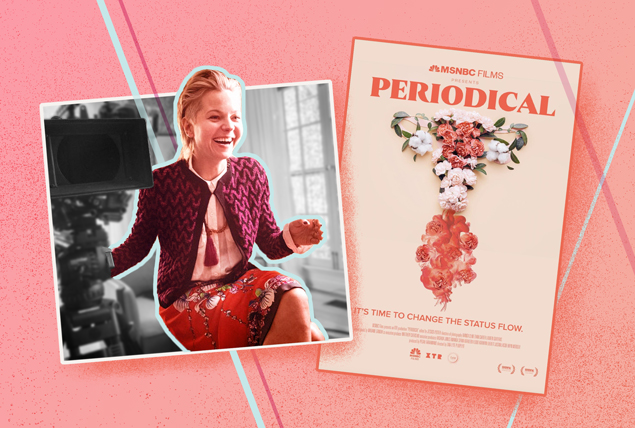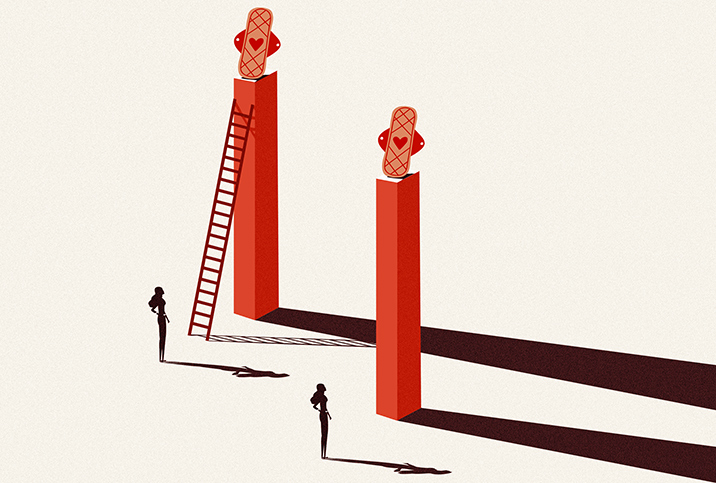Back Talk: A Conversation With 'Periodical' Director Lina Plioplyte

A new feature-length documentary from XTR and MSNBC Films explores the science, politics and mystery of menstruation. The title of the film is "Periodical" and it features well-known commentators such as activist Gloria Steinem, actor Naomi Watts and soccer star Megan Rapinoe. The goal is to reveal truths, challenge taboos and celebrate the potential of menstrual blood.
The film made its world premiere on March 10 during the South by Southwest (SXSW) cultural conference in Austin, Texas. Now scheduled to air on MSNBC in September 2023, it will then be available to stream on Peacock. (For updates, check out @periodicalmovie on Instagram.)
During SXSW, "Periodical" director Lina Plioplyte gave an exclusive interview to Giddy to discuss how the film came to be, the stigma surrounding menstruation, new period technologies and more.
Editor's note: This interview has been edited for length and clarity.
How did the documentary come to be?
Plioplyte: This film journey took six years to make. It started with me writing in my diary as I do. I wrote a poem, an ode to women, and I realized it's amazing being a woman. We're having this cycle of ours. We bleed every month and it's quite fascinating. I realized we don't really know much about it. It looked like we didn't really talk about it, either, even though it's quite a fascinating event that symbolizes my body is ready and able to create a child.
Some people call it a fifth vital sign; it's a sign you're healthy. And yet we don't really talk about it and it's taboo. Why is that?
I had a healthy curiosity and also a healthy dose of a punk rock attitude about it. So we made a movie about it. I started researching it and it turns out there's a whole menstrual movement of hundreds of people who love talking about menstruation and creating organizations and political actions about menstruation. There are people who see menstruation as a political cause and a socially very grave conversation. So something you think is just a monthly bodily fluid turns out to be very conversational. And we still aren't sure we need to talk about it.
We need to talk about it.
Even today, there are still cultural tropes about women on their period being crazy and menstruation being dirty. Has the stigma improved in recent years?
When I started researching in 2016, the tide started turning; 2015 was even proclaimed "the Year of the Period." The events that we reflect on in the film have taken place in 2015, such as Kiran Gandhi running a marathon free bleeding, which was shocking at the time. She turned it into a political statement. We started speaking about menstruation right about then and we had a first wave of these brave menstruators who said, "I'm bleeding and it's OK to talk about it."
It's OK to be on Instagram, as Rupi Kaur did in 2015, and yet Instagram took away her post. It's just a little red spot on her sweatpants and Instagram was like, "Ew, let's take it away." She was like, "No, what's wrong with this? Why are we censoring this?" There are a lot of conversations that have started, and this wave kept on growing.
As I was working on this film, I can see a huge warming up of the landscape about menstrual fluid, about menstrual conversation and the menstrual cycle in general, the uterus, what we know and what we don't know.
I think from kind of a "cringe and fringe conversation," if you will, we've moved into the mainstream. As we were creating the film, we were also becoming the witnesses of the theme itself, the subject itself, becoming more audience-friendly. I don't think it's a shocker now to say, "period." Ten years ago, it was.
The film has a wide diversity of voices, from gynecologists and researchers to athletes and kids. What was your approach in selecting people to contribute?
It was extremely important for us to showcase as many diverse voices in the film as possible; diverse not only in how people look and how they self-express but also in age and in gender expression. We wanted to capture stories from not only people from the street but we also wanted to have people you know in the film, such as Naomi Watts and Gloria Steinem, to really drive home the idea that half of the world's population, famous or not, are having menstrual cycles and are going through various experiences with it.
Some people love it and some people hate it. That was really important, to reflect this broad landscape of menstruation whether it's somebody on the contraception pill or whether it's somebody putting menstruation on their face. There are very different experiences of the menstrual cycle, and we really wanted to paint the broad picture.
Period technology has advanced in recent years with devices such as Bluetooth menstrual cups and period-tracking apps. What do you see as the technological trends going forward?
Technology is incredible. There has been a massive wave of change when we speak about how technology can help people who bleed to have a softer, more comfortable experience with it. It's not only Bluetooth cups; there are a lot of femtech technologies right now. We can really use anything from vaginal rejuvenation to a wristband that can trick your body into not feeling a hot flash; things that sound like Space Age things but actually do exist to help menstruators have a more comfortable experience.
We need to be cautious, too. There are a lot of inventions out there, and there's not that much regulation. We wanted to drive home the point that there's fascinating new territory in healing the menstruating body but we need to read the reviews and pay attention and not buy snake oil.
In the film, you spotlight the #HappyPeriod organization, which educates Black teens about periods. Sex education in general is scrutinized in the United States. What have people been advocating for specifically in terms of period education?
As I understand, right now, there is no unified direction about sexual education and menstrual health in public school systems in the United States, which is why Chelsea VonChaz founded #HappyPeriod, because kids are not taught about the full cycle. Kids are only taught about condoms and abstinence. Kids are not taught about ovulation, which is a crucial part to pay attention to if you want or don't want to get pregnant.
Chelsea gives young girls agency simply by educating them about ovulation. How funny and strange it is that we live in a system in which this knowledge and information becomes revolutionary. As we state in the film, menstrual education is a political affair in this country.
I wish we could just teach every single young menstruator about what's happening in their bodies. I really wish simple biology would be available to every student in this country, but it's not so simple. It takes one person at a time. Chelsea goes to schools in Los Angeles and shifts students' perspectives about their own bodies one class at a time. Bless her and that work, and I hope there are many, many more menstrual educators in this country.


















